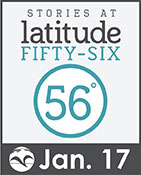

 Weekly Specials
Weekly Specials |














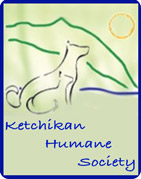

 Contact Contact 
 Call 617-9696 Call 617-9696
 Webmail
Letters Webmail
Letters
 News Tips News Tips 
 Copyright Info Copyright Info
 Archives Archives
Quick News
Search
 Alaska Alaska
 Ketchikan Ketchikan
 SE Alaska SE Alaska
 Alaska News Links Alaska News Links
Columns
- Articles
 Dave Kiffer Dave Kiffer
 Fish
Factor Fish
Factor
 Money Matters Money Matters
Historical
Ketchikan
 June Allen June Allen
 Dave
Kiffer Dave
Kiffer
 Louise
B. Harrington Louise
B. Harrington
Ketchikan
Arts & Events
 Ketchikan
Arts Ketchikan
Arts
 Ketchikan
Museums Ketchikan
Museums
 KTN Public
Library KTN Public
Library
Sports
 Ketchikan Links Ketchikan Links
Public Records
 FAA Accident Reports FAA Accident Reports
 NTSB
Accident Reports NTSB
Accident Reports
 Court Calendar Court Calendar
 Recent Filings & Case Dispositions Recent Filings & Case Dispositions
 Court Records Search Court Records Search
 Wanted:
Absconders Wanted:
Absconders
 Sex Offender Reg. Sex Offender Reg.
 Public Notices Public Notices
 AST Daily Dispatch AST Daily Dispatch
 KTN
Police Reports KTN
Police Reports
 Juneau Police Reports Juneau Police Reports
Weather,
Webcams
 Today's
Forecast Today's
Forecast
 KTN
Weather Data KTN
Weather Data
 AK
Weather Map AK
Weather Map
 AK Weathercams AK Weathercams
 AK Earthquakes AK Earthquakes
TV Guide
 Ketchikan Ketchikan
Ketchikan
Phone Book
 Yellow
Pages Yellow
Pages
 White
Pages White
Pages
Government
Links
 Local Government Local Government
 State & National State & National

|
|

Wednesday
January 13, 2016
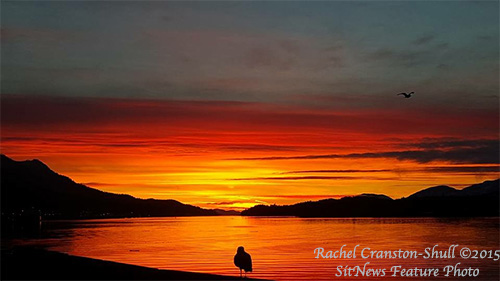
|
Greeting a New Day
Front Page Feature Photo By RACHEL CRANSTON-SHULL ©2016
Select your favorite Photo of the Month. The photographer with the most likes for the Month of JANUARY 2016 will receive $100. (Selections may be made on the SitNews' FaceBook page or emailed to the editor@sitnews.us.)
Alaska: AMHS Releases Summer 2016 Schedule - The Alaska Marine Highway System (AMHS) announced the release of its summer 2016 schedule which covers May through September. The release of the schedule coincides with the implementation of the new reservations and manifest system.
AMHS has planned a phased implementation of the new reservations system starting with the reservations call center, then followed by online reservations for summer travel. Implementation will continue with new hardware installations in terminals and aboard vessels through the spring. The system will be fully implemented by May 2016, at which time the current OARS reservation system will be retired at the conclusion of the winter 2015/16 schedule.
According to AMHS, making advance reservations is the best way to guarantee space for passengers and vehicles, and it allows the system to operate more efficiently. Fare information is available online or from reservations agents.
Reservations for the summer schedule are currently only being accepted through the Juneau Reservations Call Center by calling 800-642-0066. Online reservations for the summer schedule will be available in the coming weeks. - More...
Wednesday PM - January 13, 2016
Alaska: Pre-filed Bill Seeks to End High Cost Hotel, Dining, and Special Session Perks for Legislators - Today, three members of the Alaska House of Representatives announced that they have pre-filed legislation to stop expensive charges by some legislators for hotels and meals. The bill also bans legislators from claiming per diem payments, which can exceed $200 per day, when Special Sessions are held in their home towns with no actual hotel costs. Last summer, some legislators and staff billed the state over $400 and $500 per night (including taxes) for hotel rooms in Seattle to attend the annual summit of the National Conference of State Legislatures. This occurred as the state is facing a more than $3 billion budget shortfall.
"If a legislator wants to stay in a fancy hotel or eat an expensive meal then they can pay for it themselves. When Special Sessions move to a lawmaker's home town they should not charge the state for per diem for sleeping in their own home,” said Rep. Les Gara (D-Anchorage), who has not travelled for a legislative conference this decade. “As we grapple with a more than $3 billion budget deficit, we should be good stewards of the public's money.”
Rep. Gara, a member of the House Finance Committee, is the prime sponsor of the pre-filed legislation. Co-sponsors include Rep. Dan Ortiz (I-Ketchikan) and Rep. Harriet Drummond (D-Anchorage).
During last summer's special session in Anchorage some Republican lawmakers from the Anchorage area accepted the allowable $200 per day per diem payment. However, no Anchorage-area Democrats sought Special Session per diem when the session was moved to their hometown. Additionally, none stayed at the controversial $400 to $500 Seattle hotels. - More...
Wednesday PM - January 13, 2016
Alaska: Bristol Bay Watershed Assement report issued by Inspector General; Obtainable records show agency followed required procedures without bias or pre-determination, but employee may have misused his position - The Office of Inspector General for the U.S. Environmental Protection Agency (EPA) today issued its report concluding a review of the agency’s actions and decision to conduct an assessment of Alaska’s Bristol Bay watershed. While the Office of Inspector General found neither evidence of bias nor a pre-determined outcome on the EPA’s part, it noted that an EPA employee may have misused his position by providing, through a personal non-governmental email account, comments on a Clean Water Act Section 404(c) petition drafted by six Alaska Native tribes before the tribes submitted the petition to the EPA.
“Multiple hotline complaints and congressional inquiries prompted the Office of Inspector General to conduct this program evaluation,” said Inspector General Arthur A. Elkins. “Our report constitutes an independent determination as to whether the EPA adhered to laws, regulations, policies and procedures in developing its assessment of potential mining impacts on ecosystems in Bristol Bay.” - More...
Wednesday PM - January 13, 2016
|
Pacific NW: Climate change could cut First Nations fisheries' catch in half - First Nations fisheries' catch could decline by nearly 50 per cent by 2050, according to a new study examining the threat of climate change to the food and economic security of indigenous communities along coastal British Columbia, Canada.
"Climate change is likely to lead to declines in herring and salmon, which are among the most important species commercially, culturally, and nutritionally for First Nations," said Lauren Weatherdon, who conducted the study when she was a UBC graduate student. "This could have large implications for communities who have been harvesting these fish and shellfish for millennia."
While many studies examine the impact of climate change on large commercial fisheries, few focus on indigenous communities. The study finds that coastal First Nations communities could suffer economic losses between $6.7 and $12 million annually by 2050.
The study, published today in PLOS ONE, was conducted by scientists with the Nereus Program, an international research team led by scientists at UBC's Institute for the Oceans and Fisheries, and supported by the Nippon Foundation in Japan.
The researchers modelled how climate change is likely to affect 98 culturally and commercially important fish and shellfish species between 2000 and 2050. The study examined the impact of changes in ocean conditions such as temperature and oxygen levels on habitat suitability for these species under two possible scenarios: a low-emission scenario, where sea surface temperature would increase by 0.5 degrees Celsius, and a high-emission scenario, where sea surface temperature would increase by one degree Celsius in the northeast Pacific by 2050.
The researchers found that most of the 98 species would be affected by climate change. They projected that fish would move away from their current habitats and toward cooler waters nearer the pole at an average rate of 10.3 to 18 kilometres per decade under the low and high emissions scenarios respectively. - More...
Wednesday PM - January 13, 2016
|
|
Southeast Alaska: New report provides conservation, management strategies for yellow-cedar in Alaska - The U.S. Forest Service's Pacific Northwest Research Station today released a new report that outlines a climate adaptation strategy for yellow-cedar in Alaska.
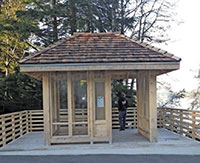
Bus stop shelter in Ketchikan, Alaska made from yellow-cedar.
Photo courtesy US Forest Service
The report, A Climate Adaptation Strategy for Conservation and Management of Yellow-Cedar in Alaska, is the first to provide a comprehensive science-based approach for managing the species in the face of climate change in the state of Alaska, where some populations of the tree have been declining over the past century. The report was produced in collaboration with land managers and specialists with the Forest Service's Alaska Region and State and Private Forestry forest health professionals and will be an important reference for the U.S. Fish and Wildlife Service to review as it considers a petition to list yellow-cedar under the Endangered Species Act.
"Our report assesses the past, current, and expected future condition of yellow-cedar forests across all land ownerships where yellow-cedar grows in Alaska," said Paul Hennon, a research forest pathologist based at the station's Juneau Lab and the lead author of the report. "The report reveals specific areas of yellow-cedar forest that are affected by tree death, those that are currently healthy but are at high risk of mortality, and those that are expected to remain healthy in the future." Considerations for active management or monitoring are offered for each of these three outcomes.
Yellow-cedar is a culturally, economically, and ecologically valuable species that grows as far north as Prince William Sound in Alaska to as far south as the northern tip of California. Some yellow-cedar populations in Alaska and British Columbia have experienced mortality over the past 100 years linked to a warming climate, Hennon and his colleagues discovered in previous work. Loss of snow cover exposes yellow-cedar's roots to freezing, which can kill the tree. - More...
Wednesday PM - January 13, 2016
|
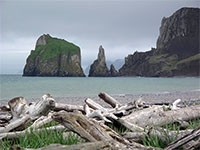
Bull Seal Point, on St. Matthew Island.
Photo by Ned Rozell |
Alaska Science: Impressions of a place far from everywhere By NED ROZELL - I’m resting on a mattress of tundra plants that are growing more than 200 miles from the nearest Alaska village. While I have snuck away here to my own private ridgetop, eight other people, all scientists, are somewhere on this 30-mile-long wedge of tundra, rocky beaches, lakes and bird cliffs in the central Bering Sea. We nine make up the entire human population of the island.
On our 25-hour boat ride here from St. Paul Island aboard the 120-foot Tiglax, Steve Delehanty, manager of the Alaska Maritime National Wildlife Refuge, pointed out that more people climb Mount Everest each year than walk on St. Matthew. There is one main reason.
“It’s hard to get to,” he said.
Sheer distance has saved this place from fur trapping, mining, oil drilling, airstrip building and other endeavors that leave a mark. A moist climate good for decomposition is also allowing St. Matthew to outlast an occupation by the U.S. military in World War II.
Thanks to the attention given to the island during the Harriman Expedition in 1899, Teddy Roosevelt included St. Matthew in a group of islands designated as America’s first wildlife refuges in 1909. Biologists from the Alaska Maritime National Wildlife Refuge, also responsible for the protection of the Aleutians and other coastal islands off Alaska, try to reach St. Matthew every five years to see what has changed.
Compared to other protected wilderness areas of Alaska, St. Matthew is of the gentle variety, at least in summer. The carpet of flowering tundra plants is alive in purples and pinks and blues, enhanced by fog-filtered sunlight. The hip-high tangles of Aleutian grasses are not here, nor are the tussocks of the North Slope; St. Matthew is a nice place to walk.
Here, you walk alone, but that wasn’t always the case. An 1874 map of St. Matthew includes this note: “Large numbers of polar bears infest this island.” The U.S. Fish and Wildlife Service crew has included in its gear a shotgun, because you never know, but we have seen neither track nor skull of polar bear. And we’ve seen only a few bleached antlers of reindeer. A few decades ago, the animals roamed the island at an unsustainable 66 animals per square mile. There are none left. - More...
Wednesday PM - January 13, 2016
|
|
Alaska: Proposed Rule Challenges State’s Wildlife Management Authority; Governor Requests Comment Period Extension - The U.S. Fish and Wildlife Service published a proposed rule last week to clarify that predator control is not allowed on national wildlife refuges in Alaska, unless necessary to meet refuge purposes, federal laws or Service policy, and is consistent with the agency’s conservation mission. The rule was developed in response to public interest and concern about predator control and recent liberalization of predator harvest within the State of Alaska.
The State of Alaska is strongly opposing these draft regulations that the state says would usurp the state’s authority to manage fish and wildlife in Alaska’s 16 national wildlife refuges.
Released recently for preliminary public review, the state says the proposed rule would require that fish and wildlife be managed for natural fluctuations, which would impact the state’s ability to manage wildlife populations for subsistence and other consumptive uses under the sustained yield concept.
As proposed, the state says the regulation would also contradict the state’s role under agreements made in the Alaska National Interest Lands Conservation Act to manage fish and wildlife on all lands in Alaska.
“Ultimately, the new regulations would have significant impacts on Alaskans,” said Bruce Dale, director of the Division of Wildlife Conservation, “particularly those living a subsistence way of life.” - More...
Wednesday PM - January 13, 2016
Columns - Commentary
TOM PURCELL: Mastering the Fourth Industrial Revolution - The smart car is upon us and self-driving automobiles soon will be commonplace — which will be the buzz at this week's 2016 Detroit Auto Show.
In the past two or three years, you see, computer processing capacity has become powerful enough to rapidly manage and analyze massive amounts of complex data sets or "big data."
What does this mean for automobiles?
By installing incredibly intricate roadside sensor networks and additional sensors in "smart" automobiles — both of which feed continuous data, via the Internet, to a powerful collection engine — automobiles will be in constant communication with road conditions and each other.
Smart cars can be programmed to avoid crashing into roadside obstacles and each other, auto-correct if a driver strays from the road or sound an alarm if a driver shows signs he's falling asleep. - More...
Wednesday PM - January 13, 2016
|

Editorial Cartoon: State Of the Union 2016
By Rick McKee ©2016, The Augusta Chronicle
Distributed to subscribers for publication by Cagle Cartoons, Inc.
|
Viewpoints
Commentary
Opinions/Letters
Basic
Rules &
Freedom of Speech
Questions, please contact
the editor at editor@sitnews.us or call 617-9696
Sitnews reserves the right to edit.
 THE STATE FINANCIAL CRISIS IS A SHAM & A SCAM AND SO IS THE PROPOSED SOLUTION By David G Hanger - The average price paid for North Slope oil in fiscal year 2015 was $73 a barrel which exceeded by a fair margin the state’s forecast of $67 a barrel. In the meantime in the second half of calendar year 2015 North Slope oil production was 20,000 barrels per day more than last year. (Figures from State of Alaska, various reports.) Total production levels for 2014 exceeded 95.25% of the production levels of 2013. - More... THE STATE FINANCIAL CRISIS IS A SHAM & A SCAM AND SO IS THE PROPOSED SOLUTION By David G Hanger - The average price paid for North Slope oil in fiscal year 2015 was $73 a barrel which exceeded by a fair margin the state’s forecast of $67 a barrel. In the meantime in the second half of calendar year 2015 North Slope oil production was 20,000 barrels per day more than last year. (Figures from State of Alaska, various reports.) Total production levels for 2014 exceeded 95.25% of the production levels of 2013. - More...
Wednesday PM - January 13, 2016
 Transportation Funding Fallacies Deserve Correction By Marc Luiken - Alaskans are facing a sobering reality: we can no longer afford the same service levels from state government. An oil revenue-induced state deficit resulted in the Alaska State Legislature reducing government’s fiscal year 2016 general fund budget by $404.1 million. These cuts affected every state agency. The Legislature directed the Department of Transportation and Public Facilities (ADOT&PF) to reduce its general fund operating budget by $34.6 million. - More... Transportation Funding Fallacies Deserve Correction By Marc Luiken - Alaskans are facing a sobering reality: we can no longer afford the same service levels from state government. An oil revenue-induced state deficit resulted in the Alaska State Legislature reducing government’s fiscal year 2016 general fund budget by $404.1 million. These cuts affected every state agency. The Legislature directed the Department of Transportation and Public Facilities (ADOT&PF) to reduce its general fund operating budget by $34.6 million. - More...
Monday AM - January 11, 2016
 GOP & NRA By Jim Dornblaser - I can identify with both GOP & NRA because I support our constitution TOTALLY as written. If you see any humor in name calling (cry baby, etc.) when reason & common sense fail, go stand with your 'unilateral' acting leader (isn't that a dictator?) He surely isn't representing the will of the majority (as in democracy). - More... GOP & NRA By Jim Dornblaser - I can identify with both GOP & NRA because I support our constitution TOTALLY as written. If you see any humor in name calling (cry baby, etc.) when reason & common sense fail, go stand with your 'unilateral' acting leader (isn't that a dictator?) He surely isn't representing the will of the majority (as in democracy). - More...
Monday AM - January 11, 2016
 Correctional Officers’ Actions Misrepresented By Brad Wilson - The video of Mr. Kobuk recently released by the State contained images of Correctional Officers performing required duties as directed by Department of Corrections’ Policy and Procedure and in accordance with their training. Without educating the public, or even giving the policies that govern Officers’ actions, the Governor’s Investigator, Dean Williams’ publication and analysis of the video is deceptive. We had asked Dean Williams, prior to the release of this latest video, to let us do a report and explain to him the inaccuracies in his Administrative Review. Correctional Officers believe that the Governor has not been given accurate information about State polices dictating Correctional Officer’s actions. - More... Correctional Officers’ Actions Misrepresented By Brad Wilson - The video of Mr. Kobuk recently released by the State contained images of Correctional Officers performing required duties as directed by Department of Corrections’ Policy and Procedure and in accordance with their training. Without educating the public, or even giving the policies that govern Officers’ actions, the Governor’s Investigator, Dean Williams’ publication and analysis of the video is deceptive. We had asked Dean Williams, prior to the release of this latest video, to let us do a report and explain to him the inaccuracies in his Administrative Review. Correctional Officers believe that the Governor has not been given accurate information about State polices dictating Correctional Officer’s actions. - More...
Monday AM - January 11, 2016
 Sealaska's Logged Off Heritage By Joe Sebastian - Last fall in Petersburg, Alaska's newest enviromental group ' The Greater Southeast Alaska Conservation Community' [GSACC.net] gave a slideshow on the latest industrial logging now taking place on Sealaska land, state land, and other land grant interests.Images from Google-earth satillight overviews were used of Sealaska mega-clearcuts on the Cleveland Penensula, and also P.O.W.'s Election Creek, and other examples made the truth crystal clear. The all-out push by Senator Lisa Murkowski to privatize land from the Tongass National Forest, in order to rapidly de-forest and export round logs as fast as possible, was shocking and upsetting and holds dire consequences for the future of Alaskans. - More... Sealaska's Logged Off Heritage By Joe Sebastian - Last fall in Petersburg, Alaska's newest enviromental group ' The Greater Southeast Alaska Conservation Community' [GSACC.net] gave a slideshow on the latest industrial logging now taking place on Sealaska land, state land, and other land grant interests.Images from Google-earth satillight overviews were used of Sealaska mega-clearcuts on the Cleveland Penensula, and also P.O.W.'s Election Creek, and other examples made the truth crystal clear. The all-out push by Senator Lisa Murkowski to privatize land from the Tongass National Forest, in order to rapidly de-forest and export round logs as fast as possible, was shocking and upsetting and holds dire consequences for the future of Alaskans. - More...
Monday AM - January 11, 2016
 Alaska Marine Toll Ferry By Patrick Jirschele - We have to pay to take the Alaska Marine Highway. We pay a toll. The toll for two people and a nineteen foot car from Bellingham to Ketchikan is $1204 or about $1.80 a mile. Ketchikan to Wrangell is $101 or a toll of $2.06 a mile. Wrangell to Petersburg, $3.40 a mile. Petersburg to Juneau about $3.00 per mile. - More... Alaska Marine Toll Ferry By Patrick Jirschele - We have to pay to take the Alaska Marine Highway. We pay a toll. The toll for two people and a nineteen foot car from Bellingham to Ketchikan is $1204 or about $1.80 a mile. Ketchikan to Wrangell is $101 or a toll of $2.06 a mile. Wrangell to Petersburg, $3.40 a mile. Petersburg to Juneau about $3.00 per mile. - More...
Monday PM - January 04, 2016
 Supreme Court Reinforces Science-based Salmon Management, Value of Setnet Fishery By Andy Hall - The Alaskan families who comprise Cook Inlet’s century-old East Side Setnet fishery are both elated and relieved that Alaska’s Supreme Court has ruled the anti-setnet initiative unconstitutional. As a result of this decision, hundreds of Alaskan families will go into the new year without the threat of losing our businesses, our incomes, our investments and our way of life hanging over our heads. More important Cook Inlet’s salmon runs will continue to be managed by the principles of conservation and science rather than politics and misinformation. - More... Supreme Court Reinforces Science-based Salmon Management, Value of Setnet Fishery By Andy Hall - The Alaskan families who comprise Cook Inlet’s century-old East Side Setnet fishery are both elated and relieved that Alaska’s Supreme Court has ruled the anti-setnet initiative unconstitutional. As a result of this decision, hundreds of Alaskan families will go into the new year without the threat of losing our businesses, our incomes, our investments and our way of life hanging over our heads. More important Cook Inlet’s salmon runs will continue to be managed by the principles of conservation and science rather than politics and misinformation. - More...
Monday PM - January 04, 2016
 Four Oblivious Apocalyptic Horsemen By Donald Moskowitz - President Obama, Secretary of State Kerry, former Secretary of State Clinton, and Senator Bernie sanders are oblivious to the danger posed by ISIS. - More... Four Oblivious Apocalyptic Horsemen By Donald Moskowitz - President Obama, Secretary of State Kerry, former Secretary of State Clinton, and Senator Bernie sanders are oblivious to the danger posed by ISIS. - More...
Monday PM - January 04, 2016
 Ketchikan Board of Education By A. M. Johnson - School Board President Ms. Michele O Brien's letter in retort to Ms. Moran makes one's eyes cross. This writer read Ms. Moran's offerings complete with backup documentation, in addressing Ms. Moran's view of the current school board's activities. Is there some item or part addressed that is incorrect or false? I find in reading the newspaper articles following school board meetings the meeting's news reporting content is woefully lacking in academic content. - More... Ketchikan Board of Education By A. M. Johnson - School Board President Ms. Michele O Brien's letter in retort to Ms. Moran makes one's eyes cross. This writer read Ms. Moran's offerings complete with backup documentation, in addressing Ms. Moran's view of the current school board's activities. Is there some item or part addressed that is incorrect or false? I find in reading the newspaper articles following school board meetings the meeting's news reporting content is woefully lacking in academic content. - More...
Tuesday PM - December 29, 2015
 Webmail your letter or Webmail your letter or
 Email Your Letter To: editor@sitnews.us Email Your Letter To: editor@sitnews.us
|
Articles &
photographs that appear in SitNews may be protected by copyright
and may not be reprinted or redistributed without written permission
from and payment of required fees to the proper sources.
E-mail your news &
photos to editor@sitnews.us
Photographers choosing to submit photographs for publication to SitNews are in doing so, granting their permission for publication and for archiving. SitNews does not sell photographs. All requests for purchasing a photograph will be emailed to the photographer.
|
|


















The Local Paper is now available online.
Click here for this week's printed edition.


|
|
|
![]() Contact
Contact ![]()
![]() Call 617-9696
Call 617-9696![]() Webmail
Letters
Webmail
Letters![]()
![]() News Tips
News Tips ![]()
![]() Copyright Info
Copyright Info![]() Archives
Archives![]() Alaska
Alaska![]() Ketchikan
Ketchikan![]() SE Alaska
SE Alaska![]() Alaska News Links
Alaska News Links![]() Dave Kiffer
Dave Kiffer ![]() Fish
Factor
Fish
Factor ![]() Money Matters
Money Matters ![]() June Allen
June Allen![]() Dave
Kiffer
Dave
Kiffer![]() Louise
B. Harrington
Louise
B. Harrington![]() Ketchikan
Arts
Ketchikan
Arts![]() Ketchikan
Museums
Ketchikan
Museums![]() KTN Public
Library
KTN Public
Library![]() Ketchikan Links
Ketchikan Links![]() FAA Accident Reports
FAA Accident Reports ![]() NTSB
Accident Reports
NTSB
Accident Reports![]() Court Calendar
Court Calendar![]() Recent Filings & Case Dispositions
Recent Filings & Case Dispositions ![]() Court Records Search
Court Records Search![]() Wanted:
Absconders
Wanted:
Absconders![]() Sex Offender Reg.
Sex Offender Reg.![]() Public Notices
Public Notices![]() AST Daily Dispatch
AST Daily Dispatch![]() KTN
Police Reports
KTN
Police Reports![]() Juneau Police Reports
Juneau Police Reports ![]() Today's
Forecast
Today's
Forecast![]() KTN
Weather Data
KTN
Weather Data![]() AK
Weather Map
AK
Weather Map![]() AK Weathercams
AK Weathercams![]() AK Earthquakes
AK Earthquakes![]() Ketchikan
Ketchikan![]() Yellow
Pages
Yellow
Pages![]() White
Pages
White
Pages![]() Local Government
Local Government![]() State & National
State & National















































